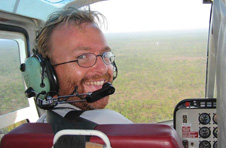
For a while, Quinn Berentson was a Scottish fish called Gordon. Playing a character in the children's television series Squirt seems a far cry from a first class honours degree in zoology, which Quinn completed in 1995. But you never know how or when freshwater ecology is going to come in handy…He had already decided he didn't want to be a scientist when he replied to a notice in the Zoology Department asking for writers for the children's television science series Oi!
'It seemed like a different way of using what I had learned,' says Quinn. 'I still used my research skills, synthesising information, and married that with other interests I had like comedy and writing and communication.
'I was a David Attenborough freak as a kid and I loved the classic nature programmes, jungles, deserts, coral reefs and things....I always wanted to know more about this incredible planet we live on.'
Quinn moved on to directing for the Get Real children's magazine series for Taylormade. 'There was no one else to do it. I made it up as I went along. That's the beauty of Dunedin - you can take your chances if you're adaptable.'
That adaptability led him to Gordon the fish in Squirt, which he was also directing, and then to work on the unnatural history series Twisted Tales with Natural History New Zealand. In 2000 he was co-nominated for an Emmy for “Best Script Writing in a Documentary” for The Twisted Tale of the Rat.
'I didn't even know it had been entered,' says Quinn. 'The result was a mad 48-hour trip to New York. Limos, champagne, and tuxedos – the works. It was fantastic!'
Since then, he has continued making science documentaries for NHNZ and several other production companies around New Zealand and Australia, on subjects as diverse as the history of medicine, blue whales, New Zealand's natural disasters, and Human Cannonballs.
An interest in the landscapes of Central Otago, first developed during his fieldwork at the Zoology Department, has recently led Quinn to seek a parallel career as a photographer, something he hopes will take him to even more strange and interesting places with his first professional exhibition happening in early July. 'Because zoology is non-professional you are not locked into a career path,' he says.
'You can steer it where you want to at varsity or go in a number of directions afterwards. 'Zoology is learning more about the things you see every day out of the window - especially in Dunedin. It gave me skills in research and self-motivation and figuring out how to do things in a way that suits your way of working.'
Quinn recommends keeping your options open. 'Don't close any doors or burn any bridges. Plan your education so that you can take advantage of opportunities when they come up. And enjoy it. It's easier to be good at something you enjoy.'
